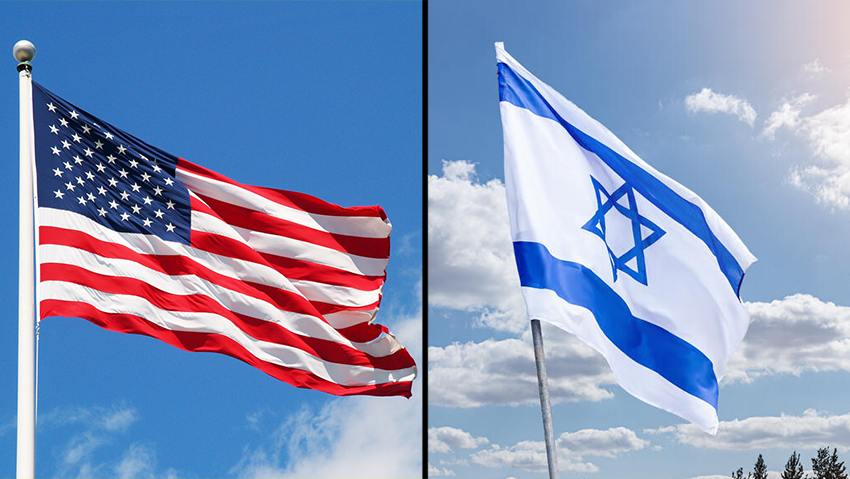Getting your Trinity Audio player ready...
Of the three members of the War Cabinet formed after October 7, Defense Minister Yoav Gallant enjoys the most public support among Israelis, with 61% viewing him favorably, according to a new Pew Research Center report released Thursday.
The report, which looks at Israeli attitudes toward the Israel-Hamas war, found that around half (51%) have a favorable view of National Unity party leader Benny Gantz.
5 View gallery


War Cabinet members: National Unity party leader Benny Gantz, Prime Minister Benjamin Netanyahu and Defense Minister Yoav Gallant
(Photo: Yair Sagi, Yariv Katz, EPA)
A majority (58%) view Prime Minister Benjamin Netanyahu in a negative light. The share of Israeli adults who have a somewhat or very unfavorable view of Netanyahu is the largest it has been since the research center first started asking the question in 2013.
The survey, fielded between March 3 and April 4, sampled a group of 1,001 Israelis and looked at their attitudes toward the Israel-Hamas war, how it’s being conducted, the United States’ role and who Israelis want to govern the Gaza Strip after the war.
The survey was conducted amid cease-fire talks mediated by Egypt and Qatar and before U.S. President Joe Biden hardened his stance toward Israel following an attack in which seven World Central Kitchen workers were killed by IDF fire in Gaza. The survey also preceded Biden's statement that the U.S. would not supply Israel with offensive weapons if Israel invades Rafah, as well as Benny Gantz's ultimatum to leave the War Cabinet.
Netanyahu slumps, concerns soar
According to the survey, Netanyahu’s favorability ratings have fallen among Jews and Arabs alike. However, roughly half of Israeli Jews still see him positively, compared with only 7% of Israeli Arabs. Favorability among right-leaning Israeli adults has also declined to 69% from 85% last year.
Two-thirds of respondents said they are confident that Israel will either probably (27%) or definitely (40%) achieve its goals in the war against Hamas.
Additionally, 61% said they are extremely or very concerned about the war expanding into other countries in the region while 68% said they are extremely or very concerned about the war going on for a long time.
Meanwhile, no clear consensus exists among Israelis about Gaza’s future governance. The largest share (40%) said Israel should govern the Gaza Strip after the war.
Conversely, almost no Israeli Arabs (3%) want Israel to govern the Gaza Strip after the war, while half of Israeli Jews think it should do so. A plurality of Arabs would like the people who live in Gaza to decide who governs (37%), while only 8% of Jews prefer this outcome.
Furthermore, just 9% of respondents said that they see Palestinian Authority Chairman Mahmoud Abbas positively while 12% hold a favorable view of his fellow Fatah party member Marwan Barghouti.
Barghouti, who is serving five life sentences plus 40 years in prison for his involvement in multiple terrorist attacks that resulted in the deaths of five Israelis in the early 2000s, is broadly popular with Arab Israelis (58% favor him), while fewer than 1% of Jewish Israelis see him in a positive light.
Meanwhile, 60% of respondents said they disapprove of the way U.S. President Joe Biden is handling the Israel-Hamas war, while 39% approve. Less than half (41%) thought he was striking the right balance between Israelis and Palestinians. Roughly a quarter each think he is either favoring the Israelis (27%) or Palestinians (25%) too much.
A majority of Israeli adults (57%) express confidence in Biden to handle world affairs and have a favorable view of the U.S. (77%), but their ratings of both Biden and the U.S. have fallen at least 10 percentage points since last year.
Most Israelis (72%) want the U.S. to play a major role in diplomatically resolving the war – more than say the same about any of the other countries or organizations we asked about.
Around a quarter of Israelis (26%) think a way can be found for Israel and an independent Palestinian state to coexist peacefully with each other. Half of Israelis think this is not possible, while another 20% say it depends.
The feeling that peaceful coexistence is possible has decreased by 9 points since last year and 24 points since the Pew Center began asking the question in 2013.
Over half (53%) said they feel generally optimistic about the future of Israel’s national security, about double the share who say they feel pessimistic (28%).
The survey found that Israeli Arabs and Jews have sharply divergent views on the war and the United States. Notably, only 38% of Arab Israelis believe Israel will achieve its war aims, compared to 76% of Jewish Israelis. Similarly, just 21% of Arab Israelis are optimistic about the country's future national security, versus 63% of Jewish Israelis.
Arab Israelis also have a far less favorable view of the U.S. (29% compared to 90% of Jewish Israelis) and less confidence in President Biden (21% versus 66%). They are much more likely to disapprove of Biden’s handling of the war (86% versus 53%) and to see him as excessively pro-Israel (86% versus 11%). Among Arab Israelis, favorability ratings of the U.S. are at an all-time low, having dropped 15 points since 2023.
Americans disenchanted with Biden, war or both?
A similar analysis based on two Pew surveys of U.S. adults—one conducted in February and one in early April—found that many are souring on Netanyahu.
Americans have less confidence in Netanyahu than Israelis have in Biden. Only 30% of U.S. adults express some or a lot of confidence in Netanyahu, while around half (53%) have not too much or no confidence in him. An additional 15% say they have not heard of him.
By contrast, more than half of Israeli adults (57%) have some or a great deal of confidence in Biden to do the right thing regarding world affairs, whereas 42% have little or no confidence in him.
Americans’ views of Netanyahu have turned more negative over the past year. The share of Americans with little or no confidence in Netanyahu to do the right thing regarding world affairs is up 11 percentage points since March 2023 (42% then, 53% today).
Democrats are more likely than Republicans to have a negative view of Netanyahu. Approximately seven in ten Democrats and Democratic-leaning independents (71%) have little or no confidence in him, up from 56% in 2023. Around a third of Republicans and GOP leaners (34%) now take this view – up from 29% in 2023.
Israelis’ opinions of Biden have also turned more negative. While 57% of Israelis express a lot or some confidence in Biden, that’s down from 68% last year. The share of Israelis who have no confidence at all in Biden has doubled, from 9% to 18%.
And how do Americans view the Israeli people? Overall, Americans have a positive view of the Israeli people, but they are much less favorable toward the Israeli government. According to February’s survey, 64% of Americans held positive opinions of the Israeli people, while only 41% viewed the Israeli government positively.
The survey also examined Israeli opinions on the IDF's actions against Hamas in Gaza: 39% believe the IDF's actions are appropriate; 34% think the IDF is not doing enough; and 19% feel the IDF has gone too far.







